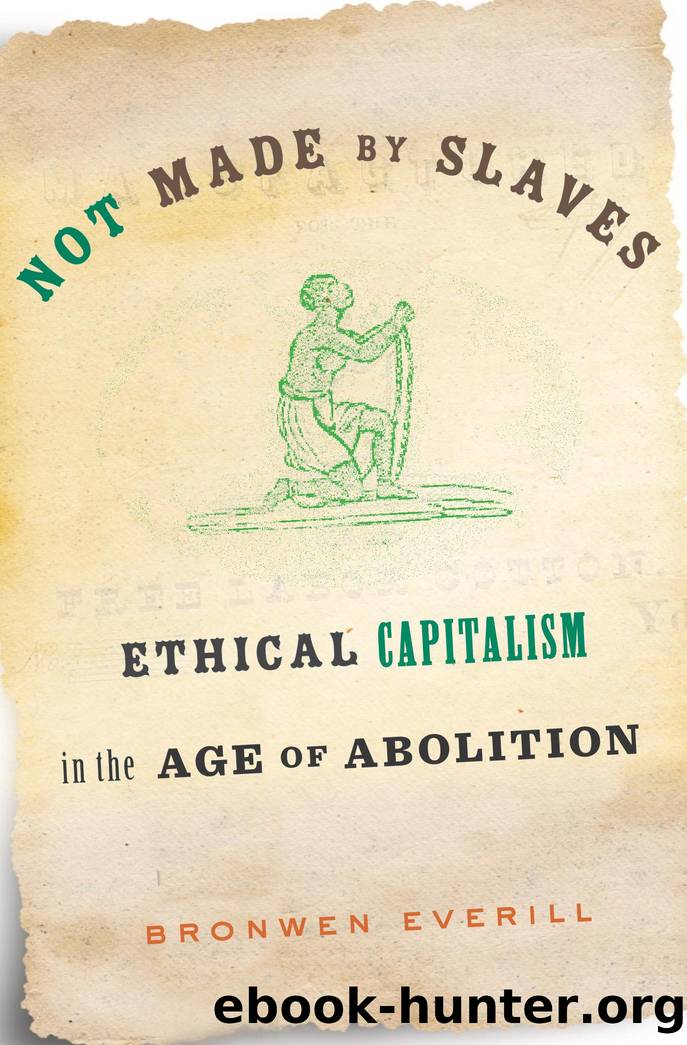Not Made by Slaves by Bronwen Everill

Author:Bronwen Everill
Language: eng
Format: epub
Publisher: Harvard University Press
* * *
THE DESIRE TO CREATE DEMAND for legitimate commerce drove businessmen like Zachary Macaulay and James Cropper into contradictory positions. Using their government connections and their public profilesâgained through participation in the abolition movementâthey both supported government intervention and subsidy, and supported tariff-free trade. Government monopoliesâwhether British or West Africanâwere unpopular, but as a frustrated Macaulay grumbled, it didnât seem fair that legitimate production of goods like rice in West Africa had to go without the support that slave traders from the region had been granted for over a century. In order to level the playing field, promoters of legitimate commerce hoped both to benefit from government largesse and to lobby those same governments to cut back on the preferential tariffs that supported production of colonial goods in some colonies but not in others. Moral commerce could be profitable in the same ways ordinary trade could be: by taking advantage of information asymmetries and network advantages.
Tariffs were controversial because they undermined the ability of consumers to determine what the most efficient form of labor was, making it seem like the self-interested consumer should support slavery. But free labor, Adam Smith and the abolitionists misguidedly argued, was more efficient than enslaved labor. This meant that they believed plantations run with slave labor would naturally cease production once free labor demonstrated its commercial superiority. But with tariffs, the whole market was distorted. Tariffs created a government-sanctioned monopoly for the West Indies and empowered slave-trading states in West Africa. If the market was skewed by colonial preference and government support of the institution of slavery, though, then surely abolitionist businessmen should take as much advantage as they could of those same policies to favor their own businesses. If there wasnât equal footing in the free market, then the only way to find it was to create as much of a lobby for their legitimate produce as there was for the West Indian plantersâ. In particular, Macaulay built on his firmâs experience of attempting to create a (debt-based) monopsony for rice in Sierra Leone to create a plan for cheap, free-labor sugar production in India.
But the businesses that pushed back against the West Indian sugar lobby also experienced public skepticism regarding their true motives. Were they just using the antislavery movement to whitewash their own business practices, as Cruikshankâs cartoon suggested? Or were they showing that God favored moral commerce by bestowing long-term profitability? Macaulay and Cropper argued that the West India sugar monopoly unfairly taxed consumers to support an unethical form of labor. But in formulating their argument, and coming up with alternative business proposals, they drew attention to some of the inconsistencies in the arguments of ethical businesses. As long as making a profit was an acceptable part of the ethical capitalism model, there would be concerns about the nature of that profit and at whose expense it was made, especially once it became clear there would be new winners and losers as abolition took effect, and that choices would need to be made about whom ethical commerce was meant to benefit.
Download
This site does not store any files on its server. We only index and link to content provided by other sites. Please contact the content providers to delete copyright contents if any and email us, we'll remove relevant links or contents immediately.
| Africa | Americas |
| Arctic & Antarctica | Asia |
| Australia & Oceania | Europe |
| Middle East | Russia |
| United States | World |
| Ancient Civilizations | Military |
| Historical Study & Educational Resources |
Magic and Divination in Early Islam by Emilie Savage-Smith;(1533)
Papillon by Henry Charrière(1434)
Bohemians, Bootleggers, Flappers, and Swells: The Best of Early Vanity Fair by Bohemians Bootleggers Flappers & Swells- The Best of Early Vanity Fair (epub)(1411)
Ambition and Desire: The Dangerous Life of Josephine Bonaparte by Kate Williams(1393)
Twelve Caesars by Mary Beard(1315)
Operation Vengeance: The Astonishing Aerial Ambush That Changed World War II by Dan Hampton(1164)
What Really Happened: The Death of Hitler by Robert J. Hutchinson(1163)
London in the Twentieth Century by Jerry White(1147)
The Japanese by Christopher Harding(1133)
Time of the Magicians by Wolfram Eilenberger(1126)
Twilight of the Gods by Ian W. Toll(1120)
Lenin: A Biography by Robert Service(1078)
The Devil You Know by Charles M. Blow(1026)
A Social History of the Media by Peter Burke & Peter Burke(977)
Freemasons for Dummies by Hodapp Christopher;(965)
Napolean Hill Collection by Napoleon Hill(943)
Henry III by David Carpenter;(919)
The Rise and Triumph of the Modern Self by Unknown(916)
Richard III (The English Monarchs Series) by Charles Ross(910)
